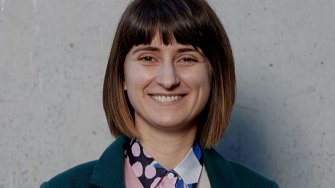
Ivana Popovac has worked for Cochlear, a leader in implantable hearing devices, since completing her Bachelor of Electrical Engineering and Master of Biomedical Engineering at UNSW in 2010. Today, she manages a large team of Systems Engineers, who design next-generation medical devices from concept to launch.
Why did you choose biomedical engineering?
My family history gives me a deep sense of social justice, and so I wanted to make sure that my career choice let me give back to the community. My father was an electrical engineer, so I knew a little about the field. In high school I enjoyed maths and physics, and music was (and still is) a passion of mine. For me, biomedical engineering combines all of these things into one – letting me practise the skills I love, while making a real impact on peoples’ lives. Working for Cochlear, whose mission is to restore peoples’ sense of hearing, is the cherry on top!
What device have you worked on that has brought you the most satisfaction?
The Cochlear Nucleus 7 Sound Processor is the world’s first cochlear implant system that is app controlled and has wireless audio streaming. Knowing I’ve played an important role in bringing this revolutionary technology into the hands of the people who need it is a definite career highlight.
What are the types of things you do in the day-to-day?
My job involves a lot of problem solving – as we need to look across all fields of engineering for a solution; communication – with marketing, regulatory and clinical professionals; and big-picture thinking – so understanding how one small change can impact the whole system.
Why do you find it so interesting?
The human to technology interface can be so complex that I get the feeling that we have only really scratched the surface of the possibilities. There is always going to be something new to learn or solve.
What innovations in your industry are the most exciting, and why?
One of the most amazing things happening in the medical device industry is an explosion of different applications of technology – for hearing, pain relief, epilepsy management, bionic vision, the list is vast. I love the spirit of looking for new ways to make people’s lives better.
What are the most important skills that engineers need to thrive today?
Agility, curiosity and good communication. Engineers are at the forefront of change, but they are also responding to the changing needs around them. Being able to explain your vision of the future to others requires great story-telling.
What career advice would you give your 13 to 18-year-old self?
There’s a lot of pressure on high schoolers to choose their subjects, choose their career, work hard and focus. I would tell anyone going through that stage to trust their gut, and to choose what interests them and gives them energy.
The other advice I would give is to be kind to yourself and take time to UNfocus. It’s important to get outside in nature, eat delicious food and hang out with good friends who love you. Being a teenager can be stressful, and these are the experiences that will help you to get through it.
